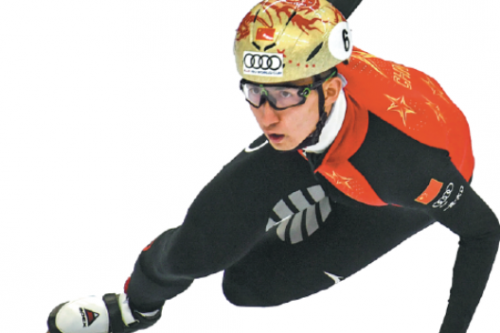



Team China targeting glory in old favorites on the ice as well as some snowy surprises
Boasting traditional strength on ice and emerging talent on snow, China looks set to show it is closing the gap to the world's winter sports superpowers at Pyeongchang 2018.
For Chinese reporters at previous Games, the Winter Olympics usually involved staying around the ice sports venues. This year in Pyeongchang, however, Team China's expanding prowess means journalistic resources are being more evenly spread across all three venue clusters in the South Korean host city.
Although not the biggest team in terms of athlete numbers, the Chinese delegation in Pyeongchang is the most diversified group since the country's Winter Olympics debut in 1980 in New York. A total of 82 athletes will compete in 55 events-11 of those making their Olympic debut-across five sports through Feb 25.
China's biggest Winter Olympics team was at the Vancouver Games, where 91 athletes competed, including our women's hockey team.
Gou Zhongwen, the delegation chief and China's sports minister, has urged Chinese Olympians to do their best on and off the ice and snow to represent the country's rising winter sports ambitions.
"We've sensed the intense fighting atmosphere since landing in Pyeongchang. Our athletes are well prepared and so eager to come out to vie with the world's best," Gou said during a pre-Games mobilization meeting in Pyeongchang.
"Yet we shall present the best manner and stick to the clean-competition principle while making the greatest effort for good results. The performance here-whatever our eventual number of medals-matters a lot to promote the profile of winter sports and inspire greater participation back home," he said.

New horizons
The national program to boost winter sports participation has yielded impressive results, highlighted by some Olympic debuts for China at the Pyeongchang Games.
The country's bobsled team, which was only established after Beijing won the right to host the 2022 Games in 2015, managed to qualify in the two-man and four-man events through a bold strategy of cross-sport talent selection and overseas training over the past two years.
Former shot put thrower Shao Yijun will now utilize his body weight to generate enough downhill speed in the four-man race-a test of speed, steering and guts.
"To be able to appear in Pyeongchang with our sled is already a success for us, given that we had to start from zero, with nothing in terms of expertise and facilities to develop this niche sport," said Shao, who was drafted in a cross-sport audition in 2015 from the Shanghai athletics team.
To make up for its weakness in knowhow, China's winter sports governing body has hired renowned sliding sports experts such as bobsledder Manuel Machata of Germany and Olympic skeleton silver medalist Jeff Pain of Canada as national team coaches.
In November, former long jumper Geng Wenqiang impressed at a skeleton World Cup race in Lake Placid, New York by finishing seventh out of a 31-strong field under Pain's guidance, heralding the rise of the sport in China.
Elsewhere, skier Chang Xinyue became the first athlete from China to qualify for an Olympic ski jumping competition after she significantly improved her ranking thanks to her results in World Cup events.
The men's and women's freestyle ski halfpipe and female snowboard parallel giant slalom in Pyeongchang will also see Chinese athletes compete for the first time at a Winter Olympics.
Eyes on the ice
Although those new events should trigger curiosity back home, the eyes of China's die-hard winter sports fans will still likely be focused on our escapdes on the ice-especially in short-track speed skating and figure skating.
Facing stiff competition from the host, China's short-track squad has prioritized relay events-the women's 3,000m and men's 5,000m-at the Gangneung Ice Arena. The team's pre-race training at the competition venue has become a hot topic in South Korean media, but China's head coach, Li Yan, has tried to play down the rivalry with the host.
"It's never been easy preparing for an Olympic Games with so much at stake. No matter how many medals won before, we have to start from zero every time and we just want to be the best we can when the time comes," said Li. Out of China's 12 gold medals won at Winter Olympics since 2002, nine were contributed by the short-track speed skating team, which used to boast veteran stars Yang Yang and Wang Meng.
However, a strong South Korean team, which holds world records in half of the eight Olympic disciplines and has reaped 15 golds at four World Cup events this season, has made China an underdog in Pyeongchang.
In individual events, men's four-time world champion Wu Dajing is China's most realistic medal hope (in the 500m), while the injury-hampered Fan Kexin, the women's 1,000m silver medalist at the 2014 Sochi Games, has been struggling to regain her pace of late.
In figure skating, world champion pair Han Cong and Sui Wenjing are strongly fancied to get on the podium in Pyeongchang after winning their first worlds in Finland last March.
Meanwhile, China's women's curling team and the mixed combo of Wang Rui and Ba Dexin are expected to bring attention back to the sport, which enjoyed a boom in popularity after the female squad won bronze at the 2010 Vancouver Olympics.
If you have any problems with this article, please contact us at app@chinadaily.com.cn and we'll immediately get back to you.